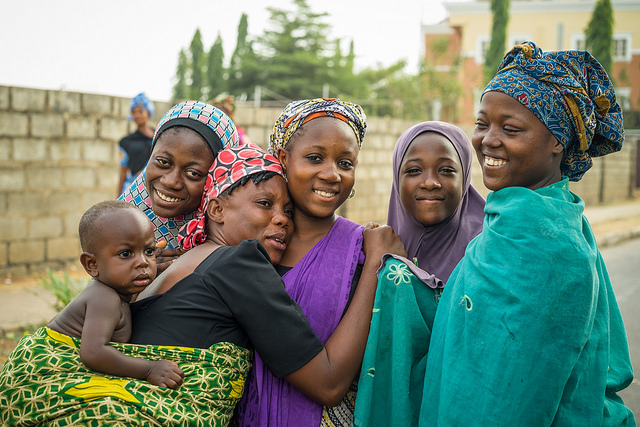Nigeria has a people problem. With a population of 167 million and one of the highest fertility rates in sub-Saharan Africa, the country is struggling with the repercussions of longstanding cultural and religious traditions that encourage large families. Alongside the booming population of young Nigerians, the country’s economy is stalling; youth unemployment hovers around 50 percent, contributing to general discontent, rising crime rates, and crumbling infrastructure.
In 2012, Nigerian President Goodluck Jonathan sparked heated national and regional debates by suggesting that families in Nigeria limit their size to only have the children that they can economically afford. On average, Nigerian households consist of 7 or 8 people, though it is not uncommon to have households as large as 12. Jonathan further advocated for the use of contraceptives, which has hovered around 15 percent, to contain population growth, emphasizing its benefits to economic growth and social well-being. Given the religiosity of Nigeria’s population, mostly Muslims and Christians, it’s unsurprising that Nigerian faith leaders strongly opposed these proposals. Figures in the Muslim nation’s community have affirmed that Islam only permits the use of contraceptives or other family planning strategies if pregnancy is hazardous to a woman’s health — not for limiting family size. In the Muslim-majority northern regions of Nigeria, a woman cannot even enter a family planning clinic unless accompanied by a man. Even in areas where contraceptives are available, their supply is often unreliable and their presence still taboo. It’s unlikely that any policy explicitly aimed at reducing the national population will gain much traction in towns and cities across Nigeria.
 The high fertility rate in Nigeria of 5.8 children sheds light on an inherent cultural desire for large nuclear families, which represent a sign of prestige in many areas, and a nationwide discouragement of the use of contraceptives. With religious and cultural traditions that both value large nuclear families and discourage the use of contraceptives, Nigerian leaders are struggling to find efficient, socially appropriate strategies to reduce the number of children that women have in their lifetimes. Since overt attempts at reproductive regulation are almost certainly doomed to fail, Nigeria must instead turn to one of the most important underlying factors in determining family size: women’s independence. Combining initiatives that support the empowerment of women with those that improve access to contraceptives will help Nigeria limit population growth and ensure security.
The high fertility rate in Nigeria of 5.8 children sheds light on an inherent cultural desire for large nuclear families, which represent a sign of prestige in many areas, and a nationwide discouragement of the use of contraceptives. With religious and cultural traditions that both value large nuclear families and discourage the use of contraceptives, Nigerian leaders are struggling to find efficient, socially appropriate strategies to reduce the number of children that women have in their lifetimes. Since overt attempts at reproductive regulation are almost certainly doomed to fail, Nigeria must instead turn to one of the most important underlying factors in determining family size: women’s independence. Combining initiatives that support the empowerment of women with those that improve access to contraceptives will help Nigeria limit population growth and ensure security.
The fact that many Nigerian citizens simply do not see the benefits of having smaller families exacerbates this population problem. Culturally, many Nigerians attribute prosperity and prestige to big family groups. If parents can feasibly afford to have many children, they do so — it wouldn’t make sense for them to sacrifice the social capital attained through the establishment of a large family unit. A long history of high rates of infant mortality also disincentivizes parents from having few children. Men have a more socially tangible stake in the issue — not only does the prestige of a large family enhance a man’s community status, but a large family is economically beneficial in existing systems of communal land-holding, in which resources are partitioned proportionally according to family size.
At the foundation of Nigeria’s gender imbalance is a skewed power dynamic, which materializes itself in the struggle for reproductive control. For many decades, men in Nigeria have played a central role in determining family size and the effectiveness of various family planning programs. While this male-centric focus hinders attempts to reduce national fertility rates, it also points to one critical element of the population problem: Women are excluded from making decisions about when and how many children they have. Few population control programs actually focus on targeting men to reduce the high birth rate. In order to make any population control program come to fruition in Nigerian households, new initiatives must reshape the unequal power dynamic between men and women.
One step in the right direction would be the enfranchisement of women through education and economic empowerment. Numerous studies have found significant correlations between female empowerment, women’s rights, and overall fertility. Nations where women have more equal rights tend to have lower fertility rates as a result. In countries like Nigeria, where women generally are considered to be of lower social status than men, parents may be more inclined to send their daughters to work or to marry at younger ages rather than sending them to school. Few parents, especially in rural areas, may see the advantage of investing in their daughter’s schooling, especially considering that working would bring the family money, and bride price is rarely linked to a girl’s educational achievement. Lack of familial support for education leads to Nigerian girls being married at younger ages, a phenomenon statistically tied to having a greater number of children. The lack of education leads to limited economic independence, meaning that many women in Nigeria don’t have the cultural or economic capital to be equal players in family planning. In some Nigerian communities, women attain authority (or just the right to participate in the process) only after giving birth to 11 children. In addition to increasing the individual agency of women, education is also strongly correlated with approval of contraceptive use, as both men and women with highly educated parents use contraceptives more regularly.
However, the problem has certainly gained attention. Currently, several programs are being developed at the national and international levels to mitigate the disparity between girls’ and boys’ access to education in Nigeria. The United Nations Girls Education Initiative, led by UNICEF, is working towards narrowing the gender divide in primary and secondary education in the country by encouraging collaboration between economic, governmental, and non-governmental actors. Nigeria is also one of many countries focused on by the World Bank, as part of its pursuit of gender equity in education within the framework of the Millennium Development goals. Additionally, several organizations within Nigeria have been striving to increase contraceptive use by increasing access to family planning resources and information, particularly in more rural and impoverished areas of the country. As contraceptive use tends to be much lower in rural areas of Nigeria, targeting these populations is essential to reducing the fertility rate of the country as a whole. Mass media has the potential to play a significant role in this attempted shift towards intentional family planning; many studies have shown that increasing exposure to mass media messages that portray family planning and contraceptive use in a positive light correlate to contraceptive use among Nigerians.
The solution may be below the surface. Nigeria must begin to address the structural inequalities that are making it difficult for women to determine their own reproductive future, starting with increasing access to education. With more children out of school than any other country, and with the vast majority of those children being girls, Nigeria has a clear starting point from which to address the issue. Women will be the key to a sustainable future for Nigeria, and empowering them through education is where the process must begin.
Art by Grace Zhang
